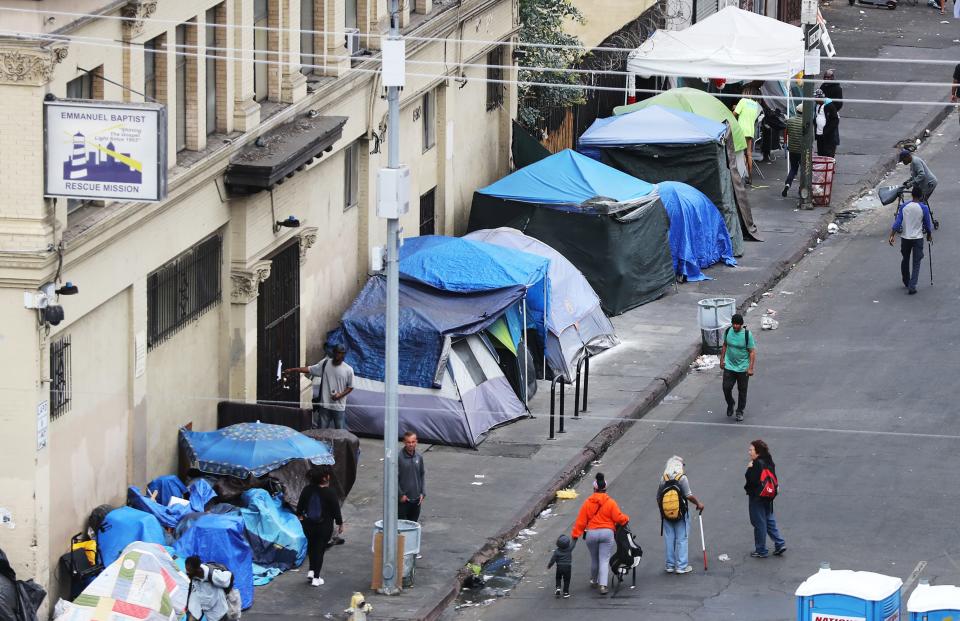Homelessness: A national problem with a local solution
Few national problems seem more intractable than homelessness.
On any given night last year, more than half a million people were experiencing homelessness in America, according to the Department of Housing and Urban Development. Recent counts place New York City’s homeless population at 78,676 and Los Angeles’ at 49,955. Thousands more, equivalent in size to small towns, can be found in city after city: more than 12,000 in and around Seattle; over 8,500 in metropolitan San Diego; and more than 6,000 each in Boston, the Las Vegas area and the county that holds Phoenix.
Even Austin, Texas, which has one of the lowest unemployment rates among America’s largest metropolitan areas (2.8%), is engaged in a heated debate over how to best address homelessness.
Washington can't solve the problem
Some look to Washington to solve the problem. But an issue this persistent and multifaceted is unlikely to be fixed by the federal government alone. Innovative new approaches are more likely to come from local communities, America’s “laboratories of democracy.”
Traditionally, most community leaders have looked to “experts” to solve problems like homelessness. They confer with faculty members at local universities, national policy specialists, members of the local medical community, shelter providers and food kitchen operators.

One group of stakeholders usually left out of the equation are those directly impacted by the problem — the homeless themselves. We forget to ask what they need to get back on their feet.
In Austin, they’ve adopted this different approach, engaging those experiencing homelessness in the fight against it, “co-creating” solutions with those living the problem.
This is a significant departure from business as usual. Who knows better the trials of asking for change, jockeying for space in a Salvation Army shelter or falling through the safety net than someone who has lived this life?
A problem years in the making: 3 things California can do to dig out of its homelessness crisis
The Austin approach is important for a second reason as well: It gives the effort legitimacy and restores trust in the process, two things in short supply today. It tells people experiencing homelessness (and everyone else in the community) that their ideas matter; that city officials are not just going through the motions for political reasons.
The brainchild of Austin’s Innovation Office, the Homelessness Advisory Committee was established in 2017. As Kerry O’Connor, Austin’s chief innovation officer, told Bloomberg Cities, “Until you understand the lived experience of people and can bring that qualitative information in, you’re always going to be flying with a skewed radar that’s sending you in a slightly off direction.”
Public engagement is worth it
Advisory committee members meet at a public library branch. The process is sometimes messy, even chaotic. “The first time we had about 15 people in the room … a lot of them were looking at us like we were crazy,” Lincoln Neiger, a member of the team working with the Austin Homelessness Advisory Committee, told us. “When it comes down to it, … they want to find a way to give back to their own community that they know is so neglected.”
Several “Why didn’t we think of this sooner?” ideas have grown out of the initiative: providing people experiencing homeless with storage lockers so they can protect their belongings while getting back on their feet; distributing travel-size personal hygiene products to those living on the street so they can carry them when they change locations; and providing them secure online access, using “blockchain” technology, to identity documents they might need for job interviews, for example.
'I couldn't give up': How I got through college as a homeless student
Because these initiatives are new, it’s way too early to evaluate their success. Even so, it’s small scale, incremental innovations such as these — coupled with large scale initiatives for mental health support, substance abuse treatment and housing — that will enable many of those experiencing homelessness to return to normal lives someday.
What’s needed now is more such experimentation. Cities need to consider new ways to address these persistent problems and to share decision-making power with those most impacted by the problems.
While financial support from Washington can help, research shows that local community entrepreneurs — citizens and leaders alike — through teamwork and trial and error, are the source of most solutions to our shared national problems. Homelessness will be no exception.
Dan Vogel is director of the Centre for Public Impact in North America, a nonprofit organization founded by Boston Consulting Group. Follow him on Twitter: @dan_vogel
You can read diverse opinions from our Board of Contributors and other writers on the Opinion front page, on Twitter @usatodayopinion and in our daily Opinion newsletter. To respond to a column, submit a comment to letters@usatoday.com.
This article originally appeared on USA TODAY: Homelessness: A national problem best solved at the local level

